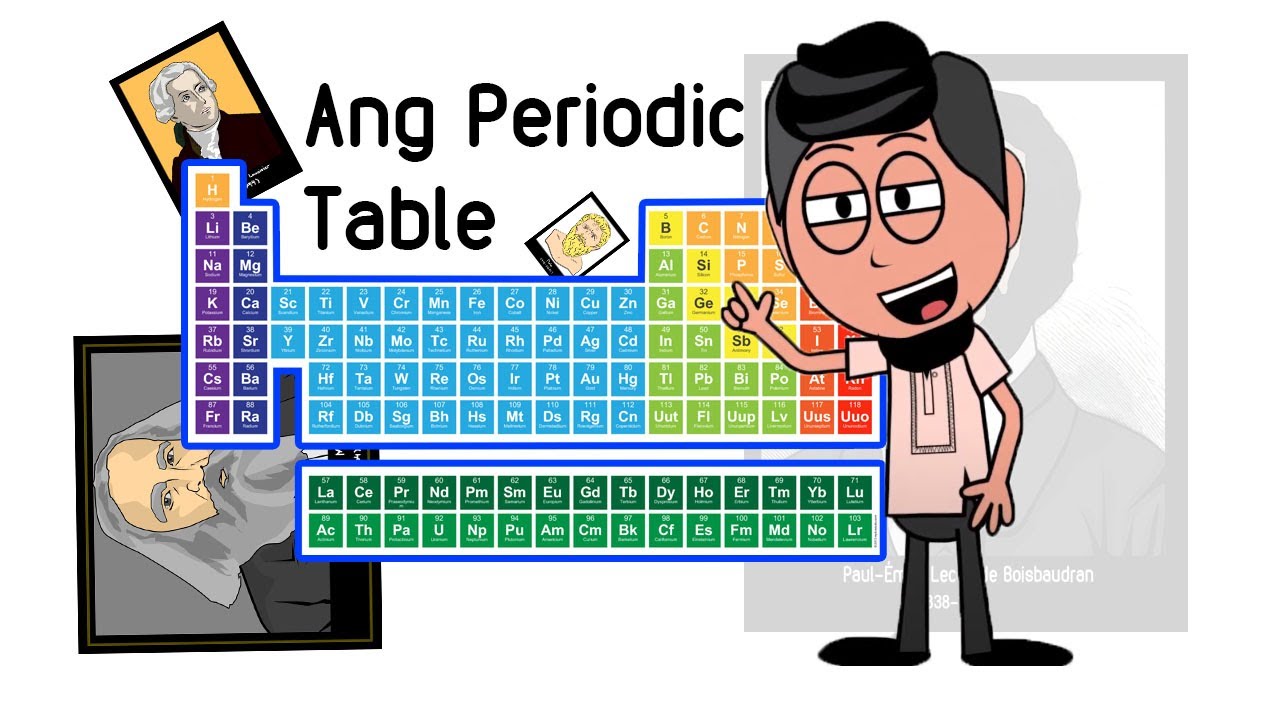A Brief History of the Periodic Table
Summary
TLDRThis lecture delves into the history of the periodic table, starting with ancient Greek philosophers like Empedocles and Aristotle who proposed four basic elements. It then moves to Antoine Lavoisier, the father of modern chemistry, who disproved the four-element theory through experiments. Finally, it highlights Dmitri Mendeleev's contribution, who organized elements by atomic number and predicted undiscovered elements, leading to the modern periodic table we know today.
Takeaways
- 🌐 The periodic table of elements is a complex chart that has evolved over time from early philosophical ideas to a modern scientific tool.
- 📜 Greek philosopher Empedocles was one of the first to propose that all substances are made from four basic elements: water, air, Earth, and fire.
- 📚 Plato, a Greek philosopher, is credited with coining the term 'elements', and his student Aristotle expanded on this by assigning properties to the elements.
- 🔬 Antoine Lavoisier, known as the father of modern chemistry, challenged the idea of the four elements and used experiments to show that water is not an element but a compound of hydrogen and oxygen.
- 🧪 Lavoisier's experiments with electrolysis and the separation of air into oxygen and nitrogen laid the groundwork for understanding elements as fundamental substances that cannot be broken down.
- 📈 Dmitri Mendeleev, a Russian chemist, is noted for recognizing patterns in the properties of elements when arranged by atomic number, leading to the development of the periodic table.
- 🔄 Mendeleev's innovative approach was to arrange elements in a table format, with elements of similar properties in the same column, which allowed for the prediction of undiscovered elements.
- 🔮 The periodic table has evolved to include not only known elements but also the prediction of new elements, showcasing the power of scientific organization and prediction.
- 🧠 The thought processes of Western philosophers and chemists like Lavoisier and Mendeleev have been instrumental in shaping our understanding and organization of chemical elements.
- 🚀 The journey from early philosophical theories to the modern periodic table represents a significant advancement in human knowledge and the scientific method.
Q & A
Who is credited with being the first Western philosopher to suggest there were four basic substances?
-Empedocles is credited with being the first Western philosopher to suggest that there were four basic substances from which all other substances are created.
What were the four basic substances proposed by Empedocles?
-The four basic substances proposed by Empedocles were water, air, Earth, and fire.
Which Greek philosopher is generally attributed with coining the term 'elements'?
-Plato is generally attributed with coining the term 'elements'.
How did Aristotle's suggestion differ from Empedocles' in terms of the four basic substances?
-Aristotle suggested that the four basic substances (water, air, Earth, and fire) have specific properties: water is cold and wet, air is hot and wet, Earth is cold and dry, and fire is hot and dry.
What method did Antoine Lavoisier use to test the theory that water is a fundamental element?
-Antoine Lavoisier used electrolysis to test the theory that water is a fundamental element, decomposing it into oxygen and hydrogen gases.
What was Antoine Lavoisier's conclusion about water and air after his experiments?
-Lavoisier concluded that water and air are not elemental substances, but that oxygen, hydrogen, and nitrogen are.
Who is considered the father of modern chemistry and what did he contribute to the understanding of elements?
-Antoine Lavoisier is considered the father of modern chemistry. He contributed to the understanding of elements by testing the theory of the four elements and proving that water and air are not elemental substances.
What did Dmitri Mendeleev notice when he lined up elements in order of increasing atomic number?
-Dmitri Mendeleev noticed that when elements were lined up in order of increasing atomic number, elements with similar chemical properties appeared at regular intervals.
How did Mendeleev's organization of the elements lead to the modern periodic table?
-Mendeleev organized the elements in a table with elements of similar chemical properties in the same column, which led to the modern periodic table. This organization also allowed him to predict the existence of undiscovered elements.
What is the significance of Mendeleev's periodic table in predicting undiscovered elements?
-Mendeleev's periodic table was significant because it not only cataloged known elements meaningfully but also predicted the existence and properties of undiscovered elements, such as the noble gases.
Outlines

Dieser Bereich ist nur für Premium-Benutzer verfügbar. Bitte führen Sie ein Upgrade durch, um auf diesen Abschnitt zuzugreifen.
Upgrade durchführenMindmap

Dieser Bereich ist nur für Premium-Benutzer verfügbar. Bitte führen Sie ein Upgrade durch, um auf diesen Abschnitt zuzugreifen.
Upgrade durchführenKeywords

Dieser Bereich ist nur für Premium-Benutzer verfügbar. Bitte führen Sie ein Upgrade durch, um auf diesen Abschnitt zuzugreifen.
Upgrade durchführenHighlights

Dieser Bereich ist nur für Premium-Benutzer verfügbar. Bitte führen Sie ein Upgrade durch, um auf diesen Abschnitt zuzugreifen.
Upgrade durchführenTranscripts

Dieser Bereich ist nur für Premium-Benutzer verfügbar. Bitte führen Sie ein Upgrade durch, um auf diesen Abschnitt zuzugreifen.
Upgrade durchführen5.0 / 5 (0 votes)






